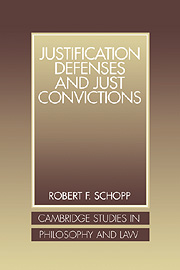Book contents
- Frontmatter
- Contents
- Preface
- Frequently Cited Sources
- Dedication
- 1 Justification Defenses: The Issues
- 2 Justification Defenses and the Conventional Public Morality
- 3 Self-defense
- 4 Self-defense and Battered Women
- 5 Duress and Systemically Complete Mitigation
- 6 The Limits of Justification: Necessity and Nullification
- 7 Conclusions
- Index
4 - Self-defense and Battered Women
Published online by Cambridge University Press: 29 October 2009
- Frontmatter
- Contents
- Preface
- Frequently Cited Sources
- Dedication
- 1 Justification Defenses: The Issues
- 2 Justification Defenses and the Conventional Public Morality
- 3 Self-defense
- 4 Self-defense and Battered Women
- 5 Duress and Systemically Complete Mitigation
- 6 The Limits of Justification: Necessity and Nullification
- 7 Conclusions
- Index
Summary
Chapter 2 advances an account of the general category of justification defenses as addressing conduct that fulfills all material elements of an offense definition but does not warrant condemnation by the standards of the fully articulated conventional public morality. Chapter 3 completes the normative framework by providing substantive moral principles, and it interprets self-defense as a justification defense in a legal system representing liberal principles of political morality. Chapter 4 applies this analysis to a set of cases that have been particularly troubling to accommodate in a satisfactory manner through the application of ordinary self-defense doctrine. These cases address claims of self-defense by battered women who have exercised deadly force against their mates who have battered them.
Although these cases raise a variety of complex issues, the emphasis on expert testimony regarding the battered woman syndrome calls particular attention to the significance of the defendants' mental states for the distinction between justification and excuse. Despite the focus of justification defenses on categories of conduct that are exempted from general prohibitory norms, many justification provisions require reasonable belief regarding the justificatory conditions rather than their actual occurrence. These battered women's cases often emphasize the putative relevance of the battered woman's syndrome to the reasonableness of the defendants' beliefs regarding the necessity of defensive force. By virtue of this emphasis on the defendants' psychological processes, these cases deviate from the standard form of self-defense in a manner that requires clarification of the parameters of and the justification for contemporary self-defense provisions as specific justification defenses.
- Type
- Chapter
- Information
- Justification Defenses and Just Convictions , pp. 89 - 135Publisher: Cambridge University PressPrint publication year: 1998

